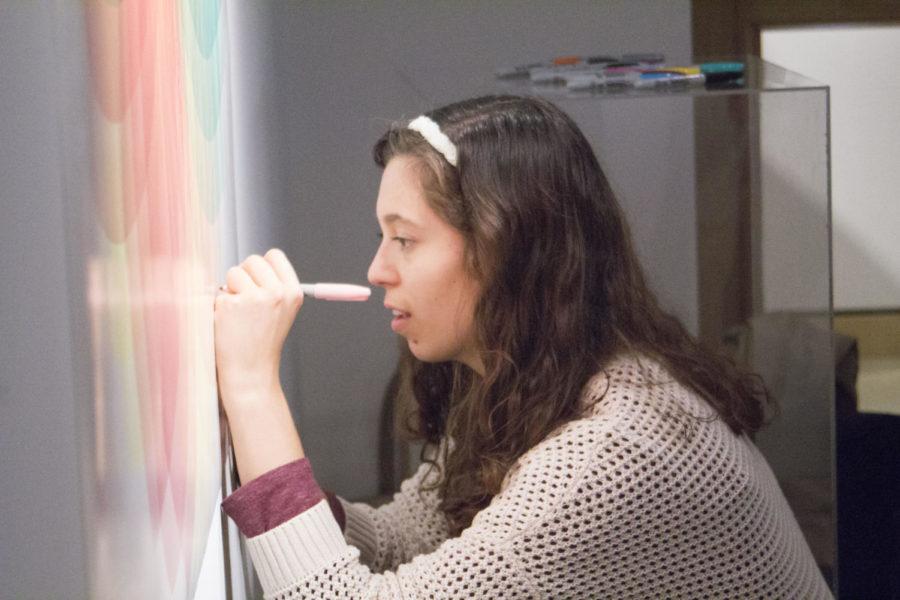Art exhibit brings attention to violence against women
Kennedy DeRaedt/Iowa State Daily
Abbey Meyerholz, a senior in history, responds to the question, “How are you feeling” on the Color Wheel of Emotion. She said that the pop-up event, “Opens the door for communication and is a way for people to heal.” The ReACT Gallery, located in the Christian Petersen Art Museum, held a pop-up event to discuss violence against women. The event was held Sept. 21 from 1 to 4 p.m.
September 23, 2018
A room of students and community members gathered together on Friday to bring awareness to violence against women, as well as mourn the death of an Iowa State student.
A pop-up art exhibition was held to support those affected by the loss of Celia Barquín Arozamena, senior in civil engineering and Iowa State golfer who was found dead on Monday.
This event is the sixth pop-up event put on as a ReACT exhibit. Other exhibits were held following events such as the Parkland shooting and the end of DACA. The exhibits are meant to use art to cause social change.
“The pop-up events started last fall as a way for people to process events,” said Nancy Gebhart, curator of the ReACT gallery. “Art is incredibly powerful and it helps us to make sense of the things happening around us.”
Held at Morrill Hall, the event showcased an interactive art exhibit, live music and tables with visitor input and resources to educate people on violence against women.
Two interactive tables were showcased at the event where visitors could write their responses and share opinions.
One table had the question, “What can we do to end violence against women?” Some of the responses included: “Stop saying sorry,” “Believe women,” “Don’t stop trying,” “Words are power,” “Men need to be here,” “Discover strength in knowledge,” “Vote,” and “The culture needs to change.”
Another table had the prompt, “Share your story. Write. Draw. Talk.”
On one wall was a color wheel where visitors were encouraged to write what emotions they have been feeling. Some of the entries were, “worried,” “anxious,” “fed up,” “empowered to speak out,” “tired,” and “alert.”
“An event like this is very important for many reasons,” said Collin Powell, graduate student in interior design who helped organize the event. “The biggest reason is that it gets us to talk about violence in a narrative that isn’t blame. It acts as a sounding board for people to voice their concerns. It acts as community healing at a time we need it the most.”
Also featured was a wall of social media feedback following the death of Barquín Arozamena. Friends, community members, classmates and family of Barquín Arozamena had expressed their heartbreak after her death.
Some of the quotes included, “I’m devastated, Celia was such an infectiously happy person.” and “No one can replace her.”
Another way for visitors to leave their input was to put sticky notes on the walls. Some of these responses said things like, “believe we can change,” and “I shouldn’t fear going places by myself.”
“We can make change, and art can often be the thing that inspires us to make that change,” Gebhart said.







